What my teen learned at a Serengeti safari camp run entirely by women
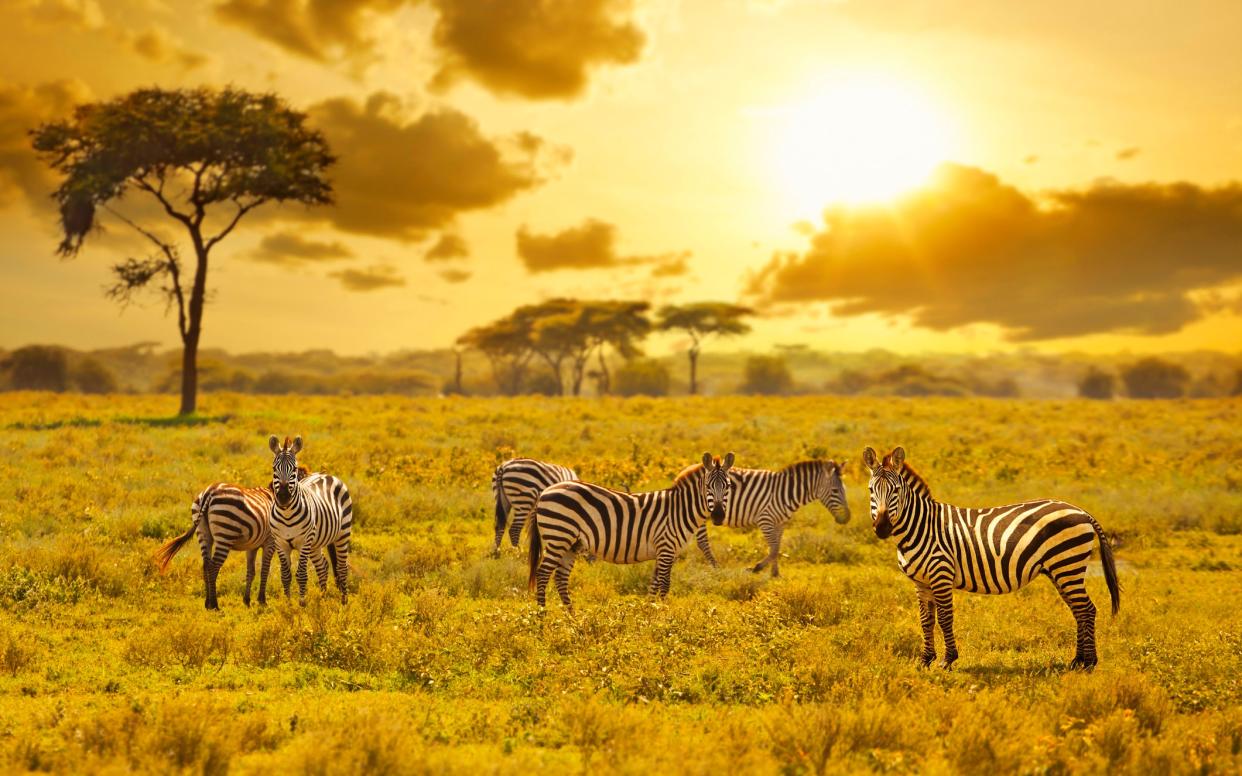
"This is for your dirty laundry,” says camp manager Angel Namshali. “And these are extra blankets.” I try to focus, but with the growl of a male lion idling like a truck on the other side of the canvas my mind isn’t entirely on the linen. “Use this radio when you’re ready for your pick-up,” she concludes, over the splintering of bone. “And do not leave the tent.”
It all started with GCSEs: my daughter Flo peering up with haunted eyes from her revision, desperate for something more exciting than covalent bonding or the Cuban Missile Crisis. After all that stress and toil, we agreed, she deserved an adventure. Besides, with sixth-form college looming and a burgeoning social life, holidays with parents might soon lose their appeal. Our girl was a young woman now, with new choices to make. Better book her in while we still could.
So here we are at Dunia Camp, in the heart of Tanzania’s Serengeti: safari tents in the middle of the bush; animals all around; a crackling fire after dark. For a girl who has always been into wildlife, adventure doesn’t get much better. It also doesn’t get much more alarming than finding lions outside our tent as we check in. Yesterday, it transpires, the local pride pulled down a buffalo just 60 yards from our deck. They retired to the bush during the day but now, with dusk approaching, are returning to feed.
Zipped in securely, we lie awake in the dark, listening to the action kicking off. “Is that one?” whispers Flo, at the rhythmic grass-swish of a large mammal passing behind the bathroom. A thunderous roar follows, jet engine-loud, obliterating all words and thought. “Er, yes,” I suggest, as the last husky exhalations peter out.
“There are always animals around,” Angel assures us, when we regale her over breakfast with the night’s adventures. “But not often lions. You were very lucky.” She explains how just yesterday afternoon she had to commandeer a vehicle to drive away elephants from the camp’s water tank.
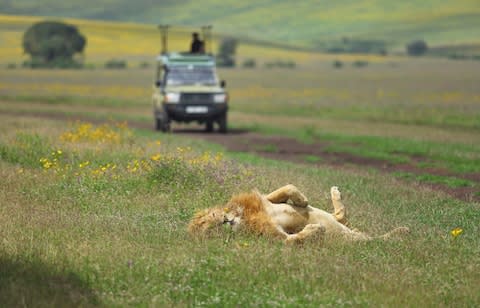
Dunia is not your average camp. Not because big game wanders through at will – in the Serengeti that comes with the territory – but more because, since 2016, it has been staffed entirely by women. Angel is, in fact, the first female camp manager in the Serengeti, and her all-female team of 23 is responsible for everything from catering to guiding.
In the macho, khaki-clad world of safari, this pioneering move by Asilia Safaris – which is committed to getting more Tanzanian women into tourism – has raised a few traditionalist (male) eyebrows. Judging from Angel’s no-nonsense dealings with the local wildlife, we are in very capable hands.
“I had this dream that I would one day be a manager,” Angel tells us. A farmer’s daughter, she was unable to take up a university offer because her father could afford only to educate her brothers. Undeterred, she worked her way up through graft and initiative, graduating from linen cupboard duties at a lodge to, eventually, running a camp of her own.
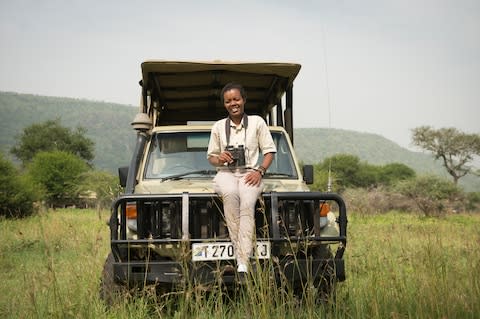
“Now I am constantly asked to give advice to young girls,” she confirms. “I tell them to make sure they finish school and not to let men take advantage of them. Women can do anything in this world.”
To our self-aware, #MeToo generation 16-year-old, on the cusp of making decisions about her own future, this is inspiring. Here is a young woman from a very different society – a deeply patriarchal one – who has battled odds we can barely imagine in order to pursue a dream.
But we are on a safari, of course, not a gender awareness workshop. And Tanzania has already offered Flo inspiration in many other forms. Our trip started at Ngorongoro, where we descended the famous crater to find wall-to-wall wildebeest, mating lions and, among rarer sightings, a serval cat trotting along the track.
Leaving the crater crowds behind, we later explored the high plateau beyond its rim, where secretary birds stalked the sward and red-robed Maasai herders led their cattle past grazing zebra. At Empakai we even had a crater all to ourselves: hiking down its forested slopes, our guide William on alert for buffalo, we spied nectar-crazed sunbirds flitting between flowering shrubs and plump tree hyraxes dozing among the limbs of strangler fig trees.
William also led us to Ottenemelo village, where we joined the women in a bead-making class. Squatting on the earth floor of one hut, squinting in the smoky gloom, we were taken aback by the tiny dimensions of the recessed bedding shelf that our host shared with her four children.

With no electricity, and predators roaming after dark, the family had to be inside by sunset. “Where do the children do homework?” Flo asked. “At school,” said William, raised in such a home. “Then they walk nine kilometres [five-and-a-half miles] home.”
This was all food for thought, especially when we returned to our rather more opulent accommodation at the Highlands Lodge, whose innovative geodesic domes glowed after dark with the light of their blazing wood burners. (It gets chilly at 8,000ft.) Over dinner, we chatted to Dr Laly Lichtenfeld, head of the conservation NGO Tanzania People and Wildlife, which works to reduce conflict between people and lions.
“Women are the ones most intimately connected to the natural environment,” she told us, explaining how her most effective projects are those that give women a voice. “But if there isn’t an elder in the boma who invites them to speak, they fall silent.”

For Flo, here was another inspiring female role model. She listened intently as Laly described her battle to succeed in a male environment. “Many women work in conservation, but they are all staying kind of there,” she said, her hands palm-down to indicate a glass ceiling. “In meetings, whoever speaks loudest gets listened to. I’ve had to learn how to bark.”
The closest to barking we hear is the high-pitched yips of black-backed jackals as, two days later, we sit around the campfire at Dunia. Here, in the central Serengeti, we find the land breathing a sigh of relief after the departure of the great migration. With the herds now far to the north, it seems that normal service is resuming: the local resident wildlife venturing out again after the chaos of all those restless hooves.
Every drive brings something new. We watch stately kori bustards – the world’s heaviest flying bird – snapping up grasshoppers among the feet of nibbling gazelles. We clock two cheetah brothers scanning the horizon from a distant termite mound. And we share our driver’s excitement when a rare black rhino thunders out of a gully and away. All the A-listers are here, but the small stuff is just as compelling: a diminutive dik-dik anointing grass-heads with its pre-orbital scent gland; a hornbill beating a fat caterpillar against a twig to remove every last poisonous hair.
On our final night, we find that Angel and her team have laid out a full bar for us on a rocky kopje. We sip sundowners and crunch toasted cashews overlooking the most endless yet of our endless vistas. A line of giraffes ambles past as the great red orb sinks below the hills. Flo can’t stop grinning.
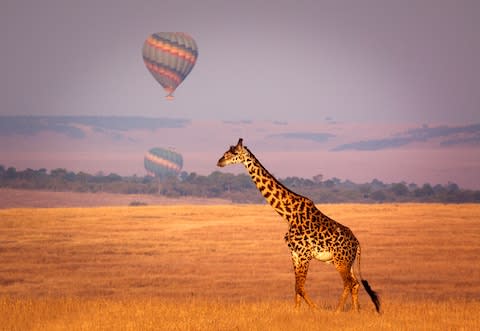
The final leg of our adventure has taken us to Ruaha. “See, this is how the men do it,” says “King” David, manager of Asilia’s Kwihala Camp, as we dismount from our jeep to a welcome song in four-part harmony with improvised kitchen percussion. An hour’s flight south of the Serengeti, this little-known park is even bigger and wilder. It is also home to the Ruaha Carnivore Project, another conservation charity that aims to resolve human/lion conflict, and another one founded by an inspiring woman: in this case, British zoologist Amy Dickman.
“I wish I could look back and tell my 16-year-old self to trust herself more,” Amy had said back in England, when I’d told her about our holiday plans with Flo. At Kwihala, we spend an evening under the stars with Michael Kimaro, one of Amy’s team.
He describes the project’s schemes to engage with the local community, including a competition in which each village receives a camera trap to record the movements of wild animals through their area at night, and is awarded points according to their rarity (5,000 for an elephant, 15,000 for a lion and so on). Not only does this produce invaluable data for the scientists; it also gives the villagers a sense of ownership of their wildlife and offers real material rewards.
“Is it working?” asks Flo, enthralled. “Yes,” says Michael. “And you can help.” He explains how volunteers can now access the images online and help sort through the thousands of snaps.
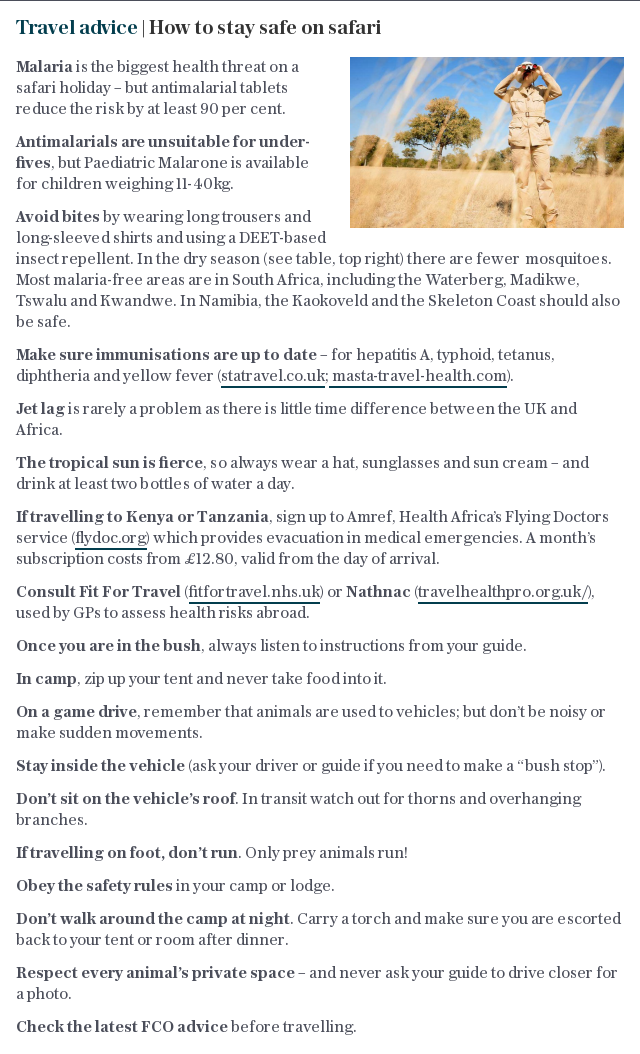
The following morning, Michael accompanies us on our dawn game drive with our eagle-eyed guide, Dulla. By chance, we meet some of the very lions whose movements he has been monitoring. He shows us how every individual can be identified by ear notches or nose patterning. And as we watch one lioness calling to locate her pride, he tells us her heart-rending story: how she was injured by a buffalo and now, struggling to hunt, has lost her cubs to starvation. Lions, it seems, have it tough. Perhaps we should have given them our tent at Dunia, after all.
We spend three days at Ruaha, combing the wilderness with barely another vehicle in sight. Elephants are everywhere, harrumphing in the thickets and digging for water in the dry riverbeds. Other highlights come thick and fast: one evening, a leopard lounging in a rain tree; the next morning, distant wild dogs bounding across the floodplain. After dark, Dulla’s spotlight picks out the eye-shine of nocturnal genets, bushbabies and eagle owls. It also brings our last lion of the safari. A formidable male, known as Mr T, he stares off into the darkness and moans softly to himself.
“It’s been the best holiday of my life,” Flo confides, on the flight home. So that’s one box ticked, at least. And her future? In Tanzania, some impressive people have shown her that a young woman’s ambition need have no barriers. She has also felt that thrilling sense of possibility that comes from the sheer grandeur of the African wilderness. Perhaps one day she’ll be a lodge manager like Angel, or a zoologist like Amy or Laly. Or perhaps she’ll be an investment banker and take us on the holiday of a lifetime. Who knows? Inspiration takes many forms. But first, A-levels.
The essentials
Steppes Travel (01285 601 050; steppestravel.com) is offering a nine-day itinerary to Tanzania from £6,295 per person, including full-board accommodation and game drives at The Highlands, Dunia Camp and Kwihala Camp. Also included are international and internal flights, plus transfers.


